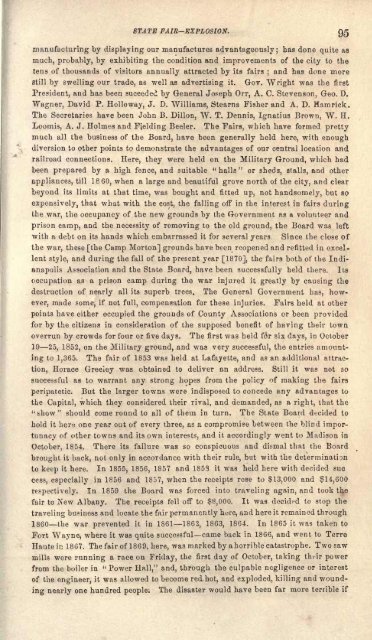Indianapolis- a historical and statistical sketch, 1870,WR Holloway
Indianapolis- a historical and statistical sketch, 1870,WR Holloway
Indianapolis- a historical and statistical sketch, 1870,WR Holloway
Create successful ePaper yourself
Turn your PDF publications into a flip-book with our unique Google optimized e-Paper software.
STATE FAIR-EXPLOSION.<br />
manufacturing by displaying our manufactures advantageously; hag done quite as<br />
much, probably, by exhibiting the condition <strong>and</strong> improvements of the city<br />
to the<br />
tens of thous<strong>and</strong>s of visitors annually attracted by its fairs ; <strong>and</strong> has done more<br />
still by swelling our trade, as well as advertising it. Gov. Wright was the first<br />
President, <strong>and</strong> has been suceedeu by General Joseph Orr, A. C. Stevenson, Geo. D.<br />
Wagner, David P. Hollo way, J. D. Williams, Stearns Fisher <strong>and</strong> A. D. Hamrick.<br />
The Secretaries have been John B. Dillon, W. T. Dennis, Ignatius Brown, W. H.<br />
Loomis, A. J. Holmes <strong>and</strong> Fielding Beeler. The Fairs, which have formed pretty<br />
much all the business of the Board, have been generally held here, with enough<br />
diversion to other points to demonstrate the advantages of our central location <strong>and</strong><br />
railroad connections. Here, they were held on the Military Ground, which had<br />
been prepared by a high fence, <strong>and</strong> suitable "halls" or sheds, stalls, <strong>and</strong> other<br />
appliances, till 1860, when a large <strong>and</strong> beautiful grove north of the city, <strong>and</strong> clear<br />
beyond its limits at that time, was bought <strong>and</strong> fitted up, not h<strong>and</strong>somely, but so<br />
expensively, that what with the cost, the falling off in the interest in fairs during<br />
the war. the occupancy of the new grounds by the Government as a volunteer <strong>and</strong><br />
prison camp, <strong>and</strong> the necessity of removing to the old ground, the Board was left<br />
with a debt on its h<strong>and</strong>s which embarrassed it for several years. Since the close of<br />
the war, these [the Camp Morton] grounds have been reopened <strong>and</strong> refitted in excel-<br />
lent style, <strong>and</strong> during the fall of the present year [<strong>1870</strong>], the fairs both of the Indi-<br />
anapolis Association <strong>and</strong> the State Board, have been successfully held there. Its<br />
occupation as a prison camp during the war injured it greatly by causing the<br />
destruction of nearly all its superb trees. The General Government has, how-<br />
ever, made some, if not full, compensation for these injuries. Fairs held at other<br />
points have either occupied the grounds of County Associations or been provided<br />
for by the citizens in consideration of the supposed benefit of having their town<br />
overrun by crowds for four or five days. The first was held for six days, in October<br />
19 25, 1852, on the Military ground, <strong>and</strong> was very successful, the entries amount-<br />
ing to 1,365. The fair of 1853 was held at Lafayette, <strong>and</strong> as an additional attrac-<br />
tion, Horace Greeiey was obtained to deliver an address. Still it was not so<br />
successful as to warrant any strong hopes from the policy ^f making the fairs<br />
peripatetic. But the larger towns were indisposed to concede any advantages to<br />
the Capital, which they considered their rival, <strong>and</strong> dem<strong>and</strong>ed, as a right, that the<br />
"show" should come round to all of them in turn. The State Board decided to<br />
hold it here one year out of every three, as a compromise between the blind impor-<br />
tunacy of other towns <strong>and</strong> its own interests, <strong>and</strong> it accordingly went to Madison in<br />
October, 1854. There its failure was so conspicuous<br />
95<br />
<strong>and</strong> dismal that the Board<br />
but with the determination<br />
brought it back, not only in accordance with their rule,<br />
to keep it here. In 1855, 1856, 1857 <strong>and</strong> 1853 it was held here with decided sue<br />
cess, especially in 1856 <strong>and</strong> 1857, when the receipts rose to $13,000 <strong>and</strong> 14,600<br />
respectively. In 1859 the Board was forced into traveling again, <strong>and</strong> took the<br />
fair to New Albany. The receipts fell off to $8,000. It was decided to stop the<br />
traveling business <strong>and</strong> locate the fair permanently hure, <strong>and</strong> here it remained through<br />
I860 the war prevented it in 1861 1862, 1863, 1864. In 1865 it was taken to<br />
Fort Wayne, where it was quite successful came back in 1866, <strong>and</strong> went to Terre<br />
Haute in 1867. The fair of 1869, here, was marked by a horrible catastrophe. Two saw<br />
mills were running a race on Friday, the first day of October, taking their power<br />
from the boiler in "Power Hall," <strong>and</strong>, through the culpable negligence or interest<br />
of the engineer, it was allowed to become red.hot, <strong>and</strong> exploded, killing <strong>and</strong> wound-<br />
ing nearly one hundred people. The disaster would have been far more terrible if


